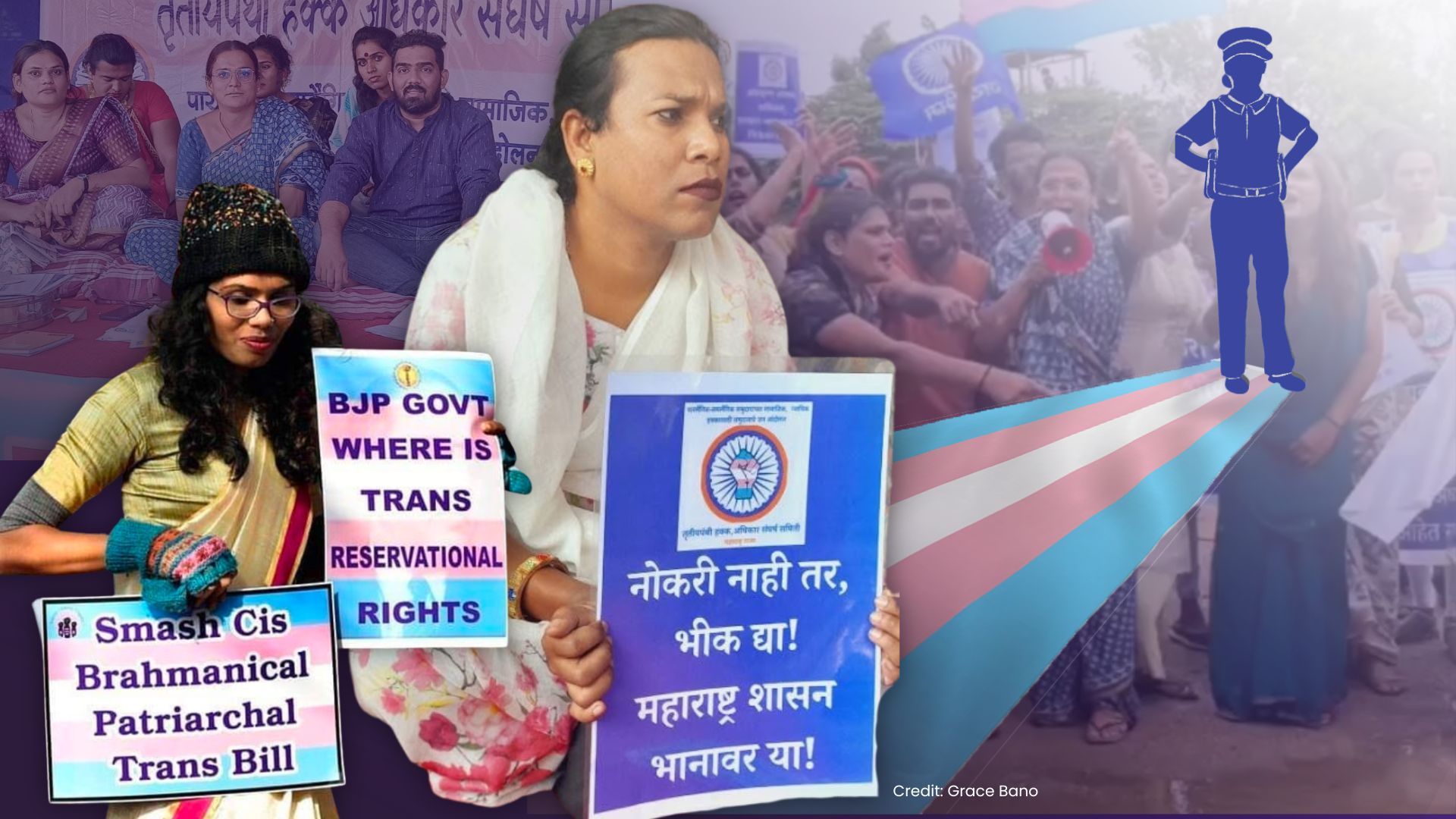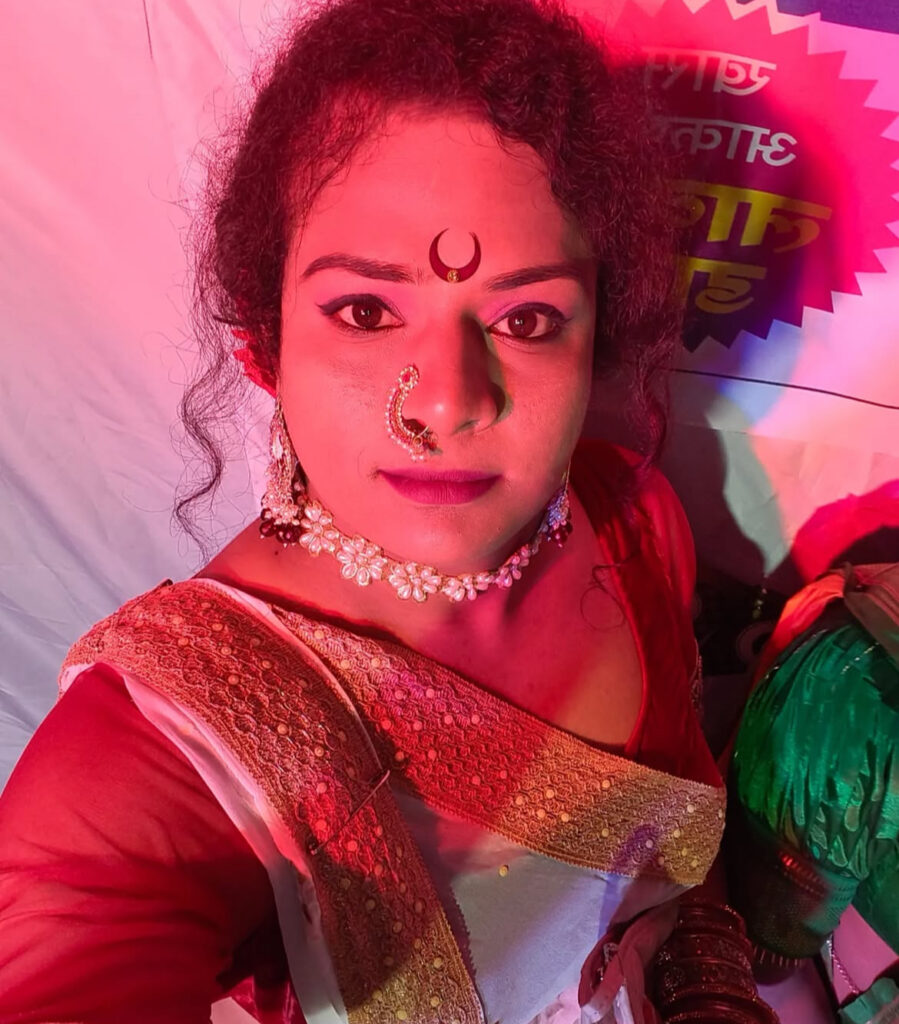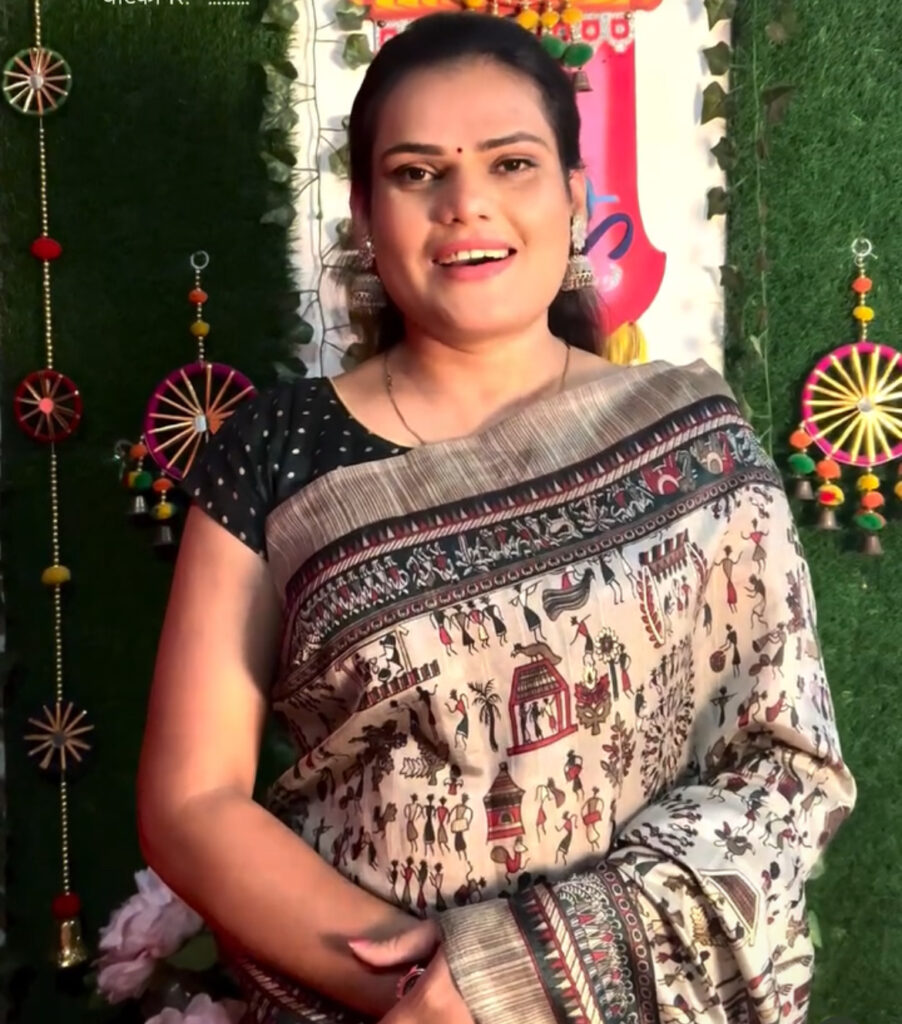Hopes Of Police Jobs Shattered, Maharashtra’s Trans women Return To Precarious Livelihoods
For five years now, Arya Pujari, a trans woman, has been relentlessly pursuing her dream of joining the police. Her struggle ties in with the transgender community’s demand for reservations in government jobs
- Priyanka Tupe

Arya Pujari, 25, left her home in Sangli, western Maharashtra, when she was still in her teens to explore her identity as a trans woman. For the last seven years, she has been working as a lavani dancer in Satara – an occupation many trans women engage in – and doing some other low-paying jobs to fend for herself.
While searching for more stable employment, Arya saw a YouTube video on the life of Prithika Yashini, the first trans woman sub inspector in Tamil Nadu. Inspired, she decided to seek a job as a constable with the Maharashtra police.
Over the last three years, she wrote the exam twice and ran into a stumbling block each time. She was declared qualified two years ago under special directions. issued by the Maharashtra Administrative Tribunal (MAT) but was still not given a job. In her next attempt, she came painfully close to qualifying but did not make it.
Arya, who is now back with the lavani troupe and preparing for the next round of recruitment exams, argues that the government recruitment process is loaded against transgender applicants – it does not recognise the marginalisation of the community, its hard struggle for livelihood or even their physical uniqueness and vulnerability. Her icon is Savitribai Phule, she tells us, and giving up is not an option for her.

“I was a man earlier, then I became a woman, but I still have better muscle strength than most women. So if the state compels me to compete with women, it would be unjust to them (the women). But if I am forced to compete with men, it would be unfair to me,” says Arya. Other trans women we interviewed point to the fact that they face multiple levels of marginalisation – caste and familial and social hostility – and the state needs to take cognisance of this in its recruitment and employment policy.
Over the last five years, Arya – and at least 70 other trans women aspirants for the constable position in Maharashtra – have been battling with an apathetic administration for a more gender-just recruitment process. They have asked for different criteria to clear the physical tests. And sought the mandated reservations as well as demand horizontal reservations for the trans community, as we explain later.
The community’s struggle has taken it to many places – it has agitated on the streets and pleaded with the judiciary and bureaucracy. So far the state administration has only met one demand – to change the criteria for physical examination. The Maharashtra Public Service Commission (MPSC) argues that there is no policy yet for reservation for transgender applicants.
This fight is not a new one. The Trutiyapanthi Hakka Adhikar Sangharsh Samiti, a Maharashtra-based collective that advocates rights for transgender persons, has been demanding a government resolution with 1 % reservations for transgender persons in education and employment since 2019. Despite meetings with local and state level stakeholders and multiple agitations, the state has remained unmoved.

In Maharashtra, a vast state marked by significant socio-economic inequalities, jobs in the police force are seen as a stable source of employment. For underprivileged and marginalised groups, especially tribal communities, they represent one of the few low-cost or cost-effective opportunities for securing employment: anyone who has cleared high school and is physically fit can apply for a constable’s job. For the first generation of educated women from these communities, these jobs are a path out of generational poverty, and a means to achieving upward mobility.
As a result, every year, even though only a few hundred posts are available in the police recruitment drive across various districts, thousands of young women apply for them.
‘We Have Unique Bodies’
Arya’s first battle with the establishment started in 2021 when the MPSC announced 145 vacancies for the post of constables in Satara police. She noticed the absence of a transgender option in the application form and approached the Bombay High Court for its inclusion. Under the court’s order, the state added the third gender option in the application. Arya then applied for the job as an OBC and transgender candidate.
Arya made two more crucial demands in her petition — that transgender persons be given reservations in police recruitment and there should be separate criteria for physical tests for them. The court referred these to the MAT. There were two other similar petitions, including one of Yashwant*, a trans man, that the MAT clubbed together with Arya’s.
In its directions to the state, the MAT asked the government to formulate a test criteria that is fair to transgender persons. Following this 2023 order, the home department made only one minor change in the criteria through a government resolution — transgender persons would not be asked to puff their chest upto 5 cm — a requirement for male candidates.
Nikita Mukhydal, Pune based trans woman aspirant explains why general parameters should not be applied to transgender aspirants in physical fitness tests: “The bodies of transgender people are different and must be tested differently. We often undergo a variety of surgeries such as sex reassignment surgery, breast implant and orchiectomy Many of us also opt for hormonal treatment.”

In 2023, the first year the state allowed transgender persons to apply under a separate gender category, 72 trans women applied for the constable position. They participated across the state in district-wise recruitment drives announced held throughout 2023. Even as they juggled their work life begging, dancing, and so on, many of them enrolled in coaching classes to prepare for the examinations. They also began training for the physical fitness tests.
But trans candidates have alleged continuing discrimination by MPSC officials in the physical exam, leading to stress and anxiety.
“My running was examined manually, other male and female candidates had an electronic chip attached to their shoes to show precise timing. Every second and millisecond counts in running, so how were they sure my supervision was done fairly without a chip?” asks Nikita.
The transgender candidates we interviewed alleged that the issuance of hall tickets to them was delayed in the 2023 recruitment drive even as other candidates got theirs before the physical test round. Anxious, both Arya and Nikita — one from Satara and the other from Pune’s Pimpri area – were forced to call senior MPSC officials repeatedly for their hall tickets. The tickets finally arrived, but only the night before the exam, they say. The other trans women we interviewed for this story, echo similar experiences.
“Before the physical test, other candidates keep their bodies relaxed and their minds stress-free. But for trans women like us, this isn’t an option. We were in a state of anxiety until the night before, worrying about our entry tickets, and went to the test ground in the morning full of stress,” Nikita says.
Despite all this, the five candidates that we interviewed said they performed well, and scored enough to qualify for the written examination.
Affirmative Action For Arya
The MAT also issued directions to the state for limited affirmative action in response to Arya’s petition.
States in India provide reservations to women for government jobs in varying proportions, for example, Maharashtra provides 30% reservations for women in government jobs whereas Madhya Pradesh provides 35%. After the gender categorisation, there are centre-mandated caste-based reservations — 15% for the SC category, 7.5% for ST and 27 % for OBC applicants. To ensure proper implementation of horizontal caste-based reservations for women, the Maharashtra Public Service commission often determines how many seats are to be reserved for SC, ST, OBC women of the total vacancies declared for a post.
Since there are no existing reservations for trans persons, the MAT suggested considering affirmative action in Arya’s case by keeping at least one reserved seat for OBCs among Satara district’s 145 vacancies. But this was to be implemented without reducing the existing quota for OBC women. Additionally, for this reserved seat, candidates needed a minimum of 25 marks in the physical test and 40 marks in the written exam, totaling 65 marks. Also, if candidates secured more than 75 marks (50% of the total), they would be granted grace marks to meet the cutoff score for selection, MAT ordered.
The tribunal also cited the Madras High Court order in the Prithika Yashini case and highlighted how the high court directed the state to take affirmative action by ordering a new cut off list. It also referred to the NALSA judgement which says the state and central government should provide transgender persons with welfare schemes without discrimination.
But the Maharashtra government pointed out that there is no provision for reservations in the Transgender Act 2019 and the state follows the reservation policy mandated by the central government – which again provides no reservations for transgender persons. (In 2021 Karnataka became the first state to provide 1% reservation to transgender persons in government jobs.)
In 2023, in her first attempt Arya obtained 39 out of 50 marks in the physical test and 63 out of 100 in the written, totalling 102 of 150. However, she was not eligible for the OBC women’s reservation because she had applied as a transgender candidate. As her marks were lower than the OBC male cutoff, and her name did not appear on the final selection list.
The OBC women’s cutoff that year was lower than marks she obtained (102), meaning if she had applied under the OBC women’s category, she would have been selected. Arya also approached the High Court again, seeking a stay on the ongoing recruitment.
The state government assured the court that it would fill all the vacancies except for Arya’s reserved seat, as directed by the MAT. The High Court refused a stay on police recruitment. But, the court also commented that transgender candidates who had scored at least 65 marks should undergo medical tests and be considered for reservation.
All five trasgender persons we interviewed for this story including Arya obtained more than 66 marks. But the Maharashtra government did not implement this directive of the court. And to this day, the seat reserved for Arya remains vacant. With a transgender reservation in place, all five trans women candidates would have been made police constables.
“After four years of hard work and preparation, followed by the grueling recruitment process, I started begging once again,” says Nikita Mukhdayal.
Arya points to the fact that children of police personnel get preference in recruitment while those like her – marginalised multiple times in terms of gender and caste – are denied government employment.
Horizontal Reservation
Arya decided to attempt police recruitment once again in 2024. She prepared for the exams and participated in the physical test during the monsoon season of June-July 2024, followed by the written exam.
This time, although she marked herself as “transgender”, and picked “OBC general” as her reservation category. Arya scored higher than in her previous attempt—126/150 – but she was four points short of the OBC general cutoff. She could have made it if she had applied as an OBC woman where the cutoff stood at 113-14.
Why did she not apply under the OBC women’s category? “If I had done that, it would have reduced opportunities for other marginalised women,” she explains.
In 2023, Arya had fulfilled all the criteria laid out by MAT for the reserved seat in Satara, and the MAT had ordered the home department to issue her an appointment letter within six weeks or appeal against it within six weeks. The government filed an appeal against it, late though, in the Bombay High Court in August 2024. The hearing has been repeatedly postponed with the latest date set for February 24.
Arya and various networks for transgender persons have been raising the question of horizontal reservations for trans persons. This implies a quota within a quota – so, for transgender persons this means a specific share within the existing SC, ST, and OBC reservations.
“Had there been a provision of horizontal reservations for us and the political will to draft a policy, we would not have been dancing on the streets today after investing four years in the application process, scoring well and spending lakhs on court cases,” says Arya.
Nikita points out that most members of her community have been abandoned by their families and excluded from structures. “So, if I become a police officer, hundreds of Nikitas in my community will find their way, and social perceptions around transgender persons will change, bringing us equality and dignity,” she says.
Back To Precarity
Nikita had left the transgender community’s guru-disciple tradition – a community space led by a senior trans woman – five years ago to seek a career. But she is back there now. “Despite extreme hardships and with no family support, I managed to complete my education up to the 12th grade and earn a diploma in arts and crafts teaching. But this system ultimately forced me to beg, didn’t it?” says Nikita.
Arya’s situation isn’t much different. As a lavani artiste, she only gets seasonal assignments. The festival season from February to May is busy for lavani artists but monsoon months bring no work. The money earned in those four festive months has to last throughout the year. For her, a police constable’s job would have meant freedom from this precarity.
When Arya was in 11th grade, she was harassed by a group of boys outside her college. At the time, a police vehicle happened to pass by. The boys fled in fear upon seeing the vehicle. Hoping for help, Arya stayed back.
“The police questioned me and put me in their mobile van. I thought they would drop me home safely. But my feminine voice and gestures gave away the fact that I am a transgender person. The police started asking inappropriate questions, touched me inappropriately and made me extremely uncomfortable. Those meant to protect me abused me instead,” recalls Arya. The realisation of the absence of transgender representation in the police is what sparked in her the dream of joining the police.
The legal and other struggles have drained the trans women of their sparse resources.
“I have spent around Rs 3-4 lakh out of my own pocket, at times pawning my golden ornaments because I felt I was fighting for my community,” says Nikita, who has run out of her savings. Arya got financial help from some individuals and Muskan, a Sangli-based non-profit.
Of the agitating trans women applicants, Vanita*, recently secured a government job as an ITI instructor, because she was entitled to a 1% reservation for orphans. Vijaya Vasave has been selected as a forest guard on a contract basis. But most others have returned to scraping a living.
Nikita, who once worked as a contracted security guard with the Pimpri Chinchwad municipal corporation on a monthly salary of RS 15,000, now begs for survival.
“I wasn’t very optimistic about our society but I hoped for something from the state. I have suffered loss of pay several times when I used to take leave for court hearings. I would wake up at 5 am, take the morning train from Pune, reach Mumbai around 11 am and be at the court for an entire day. I rarely ate anything to save money. Around 6pm, I take the train back to Pune,” says Nikita.
Transgender persons also alleged that officials from the social justice ministry, legal officers representing the state have made hostile remarks in the court.
“The judge (chairperson of MAT) had to intervene and stop them from making such comments several times,” says Kaustubh Gidh, one of the lawyers for the transwomen petitioners.
Arya found the transphobic comments painful. “They (the state representatives) said: ‘If we provide police jobs to transgender persons who do not have any manners and are known for being a nuisance in public, it will be a threat to the safety of women police constables.’ I objected and the chair of MAT allowed me to put forth my perspective.”
A trans woman who did not wish to be named said that on official platforms her community deals with casual cruelty. “We were once invited to a state programme on women’s day in 2023. One of the top ministers in Maharashtra said over a call: ‘I am here for some kind of an event organised for hijras’. They can’t even address us as transgender,” she says.
When the delegation of transgender persons met with former CM Shinde in 2023 with a charter of demands, they recalled that he seemed clueless about the community. “Unless the social justice ministry makes a clear policy for providing reservations, the home ministry can point to the absence of a policy to implement and departments can keep shifting the blame,” says Kaustubh Gidh.
Behanbox has sent a questionnaire to the state’s ministry of social justice asking about its stand on the demand for a reservation policy for transgender persons. We are awaiting a response, and this story will be updated when we receive one.
We believe everyone deserves equal access to accurate news. Support from our readers enables us to keep our journalism open and free for everyone, all over the world.

